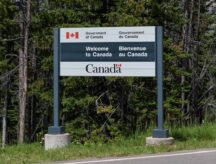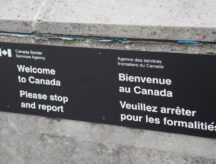Canada releases new details on how traveller information is collected at the border
Canada recently released more details on what information border officers collect from travellers, who can access the information, and more on data protection and rules for disclosure.
Canada’s Entry/Exit Program allows the border to collect basic traveller information and share it with Immigration, Refugees and Citizenship Canada (IRCC). The immigration department uses the information to verify how many days an immigration applicant stayed in Canada. The information is used to verify residency requirements for applications for permanent residence, work permits, study permits, and Canadian citizenship applications.
Canada and the U.S. have been exchanging biographic entry information on all travellers at the land border since July 11, 2019, though the program started in February 2019. They use the record of a traveller’s entry into one country to establish the exit from the other. Recently the program was extended to air travellers as well, however, this exit information is not regularly shared with the U.S.
Find out if you are eligible for any Canadian immigration programs
Data is not yet being collected for travellers entering and exiting Canada by marine ports or by rail.
What information does CBSA collect?
The Canadian Border Services Agency (CBSA) collects basic information of travellers who pass through the border.
The basic information they collect includes:
- name;
- date of birth;
- country of citizenship;
- passport details;
- date of entry or exit;
- data displayed in the Global Case Management System for immigration and citizenship applicants such as;
- client identification (i.e., family name and given names, gender, date of birth, country of birth, etc.),
- contact information and history, educational and employment information.
Who can access entry and exit information?
CBSA is the owner of the data and as such all authorized border personnel can access exit information. These border personnel include:
- border services officers and superintendents;
- criminal investigations officers and analysts;
- document analysts;
- hearings officers and hearings advisors;
- inland enforcement officers and enforcement case officers;
- intelligence officers and intelligence analysts;
- National Border Operations Centre officers;
- National Security Screening Division officers and analysts;
- National Targeting Centre (NTC) targeting officers;
- NTC targeting operations intelligence; and
- trusted traveller officers.
IRCC only retains the Entry/Exit information of a candidate who is applying for immigration.
The immigration department uses Entry/Exit information to:
- verify residency requirements to process an ongoing application by verifying information provided by the client, such as in applications for grants of citizenship or permanent resident cards;
- verify if a temporary residence applicant may have previously overstayed their allowable period of admission in Canada;
- assist in an investigation of an individual’s entitlement to a Canadian travel document;
- verify that sponsors are residing in Canada;
- verify the residency of spouses and partners under the spouse or common-law partner in Canada class;
- verify whether or not a refugee claimant entered Canada using their travel documents; and
- support investigations of possible fraud in relation to immigration, citizenship, and passport and travel document programs.
IRCC officers are not allowed to disclose entry and exit information unless it is necessary for the administration of the Immigration and Refugee Protection Act and it is covered under an existing information-sharing agreement, such as a Memorandum of Understanding.
“Any disclosure that is not explicitly covered under an existing agreement must be governed by CBSA,” the government’s website says.
Travellers have the right to request a copy of their personal travel history, and they can request a correction if they find any errors. IRCC will be notified if a traveller requests a correction to their passage information, and they are able to re-query CBSA to get the most up-to-date information.
Find out if you are eligible for any Canadian immigration programs
© 2020 CIC News All Rights Reserved
- Do you need Canadian immigration assistance? Contact the Contact Cohen Immigration Law firm by completing our form
- Send us your feedback or your non-legal assistance questions by emailing us at media@canadavisa.com







